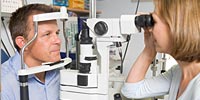|
VA Professionals and Specialized Services Provided
When loss of vision cannot be corrected with regular glasses, surgery, or medication and daily tasks are difficult or impossible to accomplish, a low vision examination and evaluation can help you learn to get the most use out of your remaining vision. Vision rehabilitation helps you make up for your vision loss by learning new methods and using the latest devices to accomplish daily activities. Confidence can be regained and greater independence can be achieved in spite of living with a loss of vision.
Our coordinated team of professionals will assist you by evaluating and addressing your specific needs. The team includes:
VA Low Vision Optometrist/Ophthalmologist will evaluate and assess your remaining vision. The goal is to maximize your remaining vision by prescribing magnification devices (microscopic glasses, magnifiers, video magnification, etc.) to help you remain independent.
VA Blind Rehabilitation Specialist or VA Blind Rehabilitation Outpatient Specialist: assesses, plans, and instructs each veteran with the emphasis on learning by doing; techniques and methods are taught and then integrated into the individual’s daily routine. By the completion of the program the Veterans should be capable of handling daily living tasks with enhanced independence. Low vision rehabilitation services include:
- Visual skills training, by a Low Vision Therapist, includes assessment, provides magnification devices such as hand-held magnifiers or closed-circuit television and training. It provides training in the appropriate use of lighting and environmental contrast with home devices. Also, there is visual efficiency training, such as adapting and maximizing their low vision ability.
- Orientation and mobility training (available in Buffalo and Syracuse) - By participating in this specialized instruction with an Orientation & Mobility specialist, you will learn how to move about your home, neighborhood, and community environment with greater ease, confidence and safety. Orientation and Mobility training focuses on developing the veteran's capacity to maintain spatial orientation and to move safely and efficiently through their environment. Veterans are trained in the efficient use of remaining senses and in the utilization of protective techniques and devices, such as the long cane, in a variety of settings.
- Living skills - consists of communication skills, where veterans learn to use devices such as tape recorders, Braille devices, typing, handwriting, and financial record keeping. Living Skills also assists veterans in achieving confidence in personal management and daily living skills necessary for independence in homemaking, shopping, cooking, dietary management, and maintenance of the living environment. Instruction in activities of daily living focuses on those tasks which have been affected due to vision loss and cause frustration and loss of independence. These areas can include writing, telling time, operating small appliances and electronics, organization, personal care, eating skills, taking medications, etc. You will learn new methods to accomplish daily tasks and be introduced to adaptive tools to help meet your goals.
- Home rehabilitation services - teaches independent living skills in the Veterans home environment.
- Computer access training (available in Buffalo) - provides specialized services to eligible blinded veterans through comprehensive adaptive computer needs assessment, prescription of equipment, training on prescribed equipment, issuance of equipment upon successful completion of training and follow-up technical support as required.
- Manual skills - develops organizational skills, environmental awareness, safe work habits, tactile ability, self-confidence, home mechanics skills, and leisure skills. Staff design special adaptive devices to meet specific needs of veterans.
- Support groups
- Recreational skills
- Advanced hoptel clinic (available at the Buffalo VA) – comfortable overnight accommodations for Veterans and eligible active duty Service members who are visually impaired and require lodging for up to nine consecutive days of onsite low vision services. Eligible patients must be able to perform basic activities of daily living independently, including the ability to self-medicate. The program offers orientation, mobility, low vision therapy, communications training, computer use and activities of daily living.
|

















